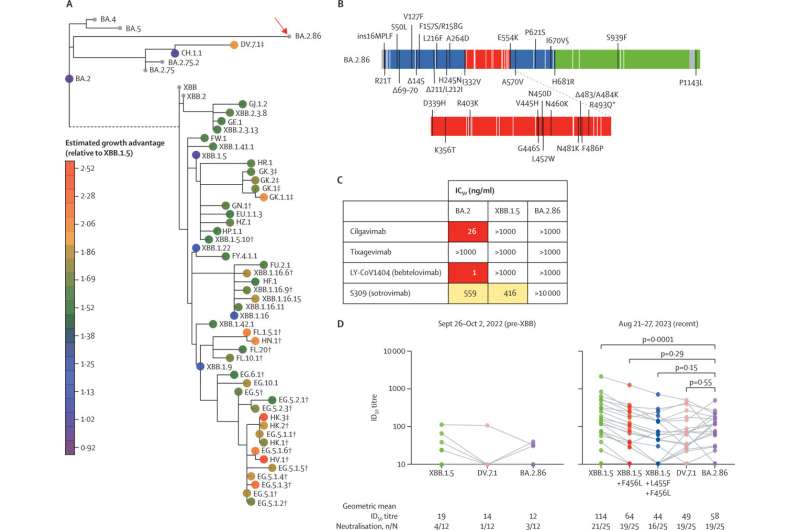This article has been reviewed according to Science X's editorial process and policies. Editors have highlighted the following attributes while ensuring the content's credibility:
fact-checked
peer-reviewed publication
trusted source
proofread
Heavily mutated SARS-CoV-2 variant BA.2.86 not as resistant to antibodies as first feared

Researchers at Karolinska Institutet who studied SARS-CoV-2 variant BA.2.86, found that the new variant was not significantly more resistant to antibodies than several other variants that are circulating. The study also showed that antibody levels to BA.2.86 were significantly higher after a wave of XBB infections compared to before, suggesting that the vaccines based on XBB should provide some cross-protection to BA.2.86.
A new SARS-CoV-2 variant—dubbed BA.2.86—has recently emerged that is very different from any other variants currently circulating, including many mutations in the spike gene, reminiscent of the emergence of omicron. The virus uses the viral spike to infect cells and is the main target for our antibodies. When the spike mutates, it comes with the risk that our antibodies are less effective against this new variant, and therefore that our protection from infection is reduced and that vaccines may need to be updated.
"We engineered a spike gene that matches that of the BA.2.86 variant and tested the blood of Stockholm blood donors (specifically those donations made very recently) to see how effective their antibodies are against this new variant. We found that although BA.2.86 was quite resistant to neutralizing antibodies, it wasn't significantly more resistant than a number of other variants that are also circulating," says Daniel Sheward, a Postdoctoral researcher in Benjamin Murrell's team at the Department of Microbiology, Tumor and Cell Biology at Karolinska Institutet and lead author of the study published in The Lancet Infectious Diseases.
An important question is whether upcoming updated vaccines that are based on the XBB variant will boost protection against BA.2.86. To determine whether antibodies triggered by infection with XBB may be effective against this new variant, Murrell's team also compared samples taken before and after XBB spread in Sweden.
"We also found that antibody levels to BA.2.86 were significantly higher after a wave of XBB infections compared to before, suggesting that the vaccines based on XBB should provide some cross-protection to BA.2.86. However, BA.2.86 was resistant to all available monoclonal antibody therapeutics that we tested," says Sheward.
It's crucial for the public health agencies to know what the current level of immunity to this new variant is, and whether the vaccines will boost protection or updated vaccine strains will be required. Monoclonal antibodies also represent an important option for some patient groups, such as the immunocompromised—for the clinicians, it's important to know which if any, monoclonal antibody therapeutics will be effective against the variants that are circulating.
"I think the main message is that there is currently no reason to be alarmed over this new variant and that it's probably a good idea to get a booster vaccine when they are offered. However, another 'omicron-like' event is also a reminder that we shouldn't get complacent," says Murrell, Principal researcher at the Department of Microbiology, Tumor and Cell Biology at Karolinska Institutet.
"We will continue to monitor new variants and the level of immunity to these in the Swedish population. We are also working on developing improved vaccines that could potentially offer broader protection," says Sheward.
More information: Daniel J Sheward et al, Sensitivity of the SARS-CoV-2 BA.2.86 variant to prevailing neutralising antibody responses, The Lancet Infectious Diseases (2023). DOI: 10.1016/S1473-3099(23)00588-1




















